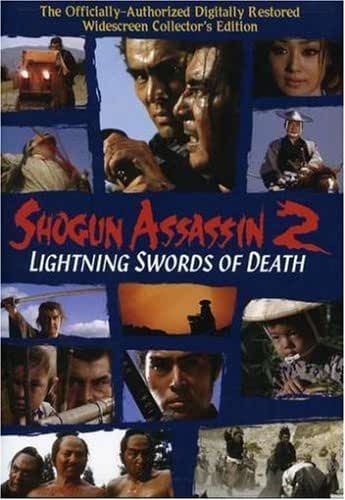***½/**** Image A- Sound A- Extras B
starring Tomisaburo Wakayama, Go Kato, Yuko Hama, Isao Yamagata
screenplay by Kazuo Koike
directed by Kenji Misumi
by Travis Mackenzie Hoover "What is a samurai?" asks a disillusioned ronin in the blood-soaked nightmare of Shogun Assassin 2*. It's a good question in context. The feudal Japan of the film–actually the third entry in the Lone Wolf and Cub series, renamed to capitalize on the famed English-language consolidation of the first two–is a lost world of corruption and brutality that makes the idea of a noble samurai seem outdated, if not ridiculous. This lends its swords-and-shooting saga an unexpected gravitas. The film is exploitation all the way, with some pleasingly ludicrous fight scenes and a leering tone that's hard to shake off, but it's also involved in its story on the script level and shot with immaculate care. It's proof that even a glorified serial can leap from the screen when the people involved invest in what's going on.
Said question is posed to Itto Ogami (Tomisaburo Wakayama), the betrayed ex-executioner who now roams the countryside with his toddler son Daigoro (Akihiro Tomikawa) and a supercharged baby carriage that makes James Bond look like Jed Clampett. As a leaderless ronin seeking paid jobs, he's often getting into scrapes, thus he's ready and willing to defend a virgin sold into prostitution after she escapes her masters. That this defense involves his taking her punishment–which entails a beating and dunking that would kill any normal human–impresses ex-chamberlain Miura Tatewaki (Jun Hamamura) enough to hire Ogami to deal with evil Governor Gemba (Isao Yamagata), who cheated him out of his position. No problem: no man is a match for Ogami.
That Ogami's employers aren't squeaky-clean shows just how far he's fallen–and how far the respectable quarters have, too. This is mirrored in the story of Magumura Kanbei (Go Kato), a straight-arrow ronin who's lost his family and now has to pledge his sword to the worst of society. Although that pits him against Ogami, honour demands that he uphold a promise to defend the governor. Indeed, in any just world they would be on the same side, but this is a '70s action movie: no such world exists. Though it would've been easy to crank up the grunge and let the parties slash and slash, one feels more of an impact. Kanbei's plight sets the often-ludicrous violence (including Ogami taking on a small army while sustaining only a few minor flesh wounds) in relief: there's a sense of what's lost, even as we enjoy it as masochistic ecstasy.
Like any other movie, the best exploitation films are personal works–and as the stalwarts at MIDNIGHT EYE have written, director Kenji Misumi was noted for his anti-feudal, anti-establishment values. Thus he brings to Kazuo Koike's script (from the manga by Koike and Goseki Kojima) a big dose of credibility, not only through his conviction but also through his immense skill. He's not all-action to the point of missing the mood: he'll throw in an insert of a cicada to embellish the heat of a summer's day. He does the best he can to provide his samurai epic feeling and sense, arguably going well above what a franchise instalment merits. It's a heroic performance, placing Shogun Assassin 2 a cut above the action pack.
Of course, this is to topload the movie with significance. At best, Shogun Assassin 2 is good, mean fun, with lovely gouts of blood and a brutal punch to the gut of sensational corruption. It's not an art movie and never pretends to be–it's just trying to egg you on with elegant nastiness. But unlike the recent Grindhouse, which pretends to pay tribute to similar movies with bad satire and smug self-satisfaction, Shogun Assassin 2 commits to its narrative. The film is a source for Kill Bill, but it goes beyond Tarantino's abstract referentiality and into an insanely earnest realm that's rooted in a time and a place–not merely Meiji Japan but the disappointment of the post-protest generation as well. Oshima it's not, but it's supremely satisfying all the same.
THE DVD
AnimEigo's DVD release is pretty good. The 2.35:1, 16×9-enhanced image is supremely lustrous for a film of such a limited palette, and though one major night exterior looks a little murky, it's generally a stellar performance in rendering the desaturated '70s tones. The Dolby 2.0 stereo sound is similarly good, perhaps a little faint but sufficient once you jack up the volume. Typically-thorough production notes, a photo gallery, and trailers for Shogun Assassin, Zatoichi's Conspiracy, and Shadow Hunters round out the disc.
89 minutes; R; 2.35:1 (16×9-enhanced); English DD 2.0 (Stereo); see review for subtitle info; DVD-5; Region One; AnimEigo
*Note: Shogun Assassin 2 is the dubbed version of Baby Cart in Hades, currently available on DVD in its original language from AnimEigo. There is no real reason to opt for Shogun Assassin 2 instead unless you have a strong aversion to subtitles. return




